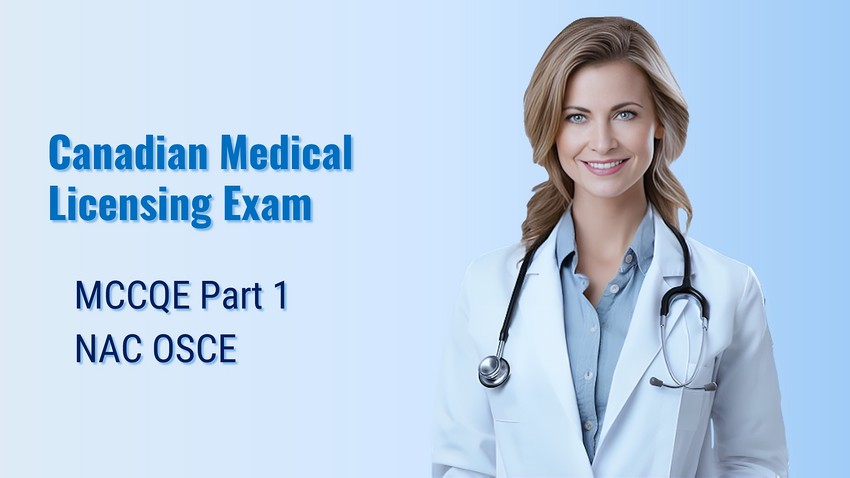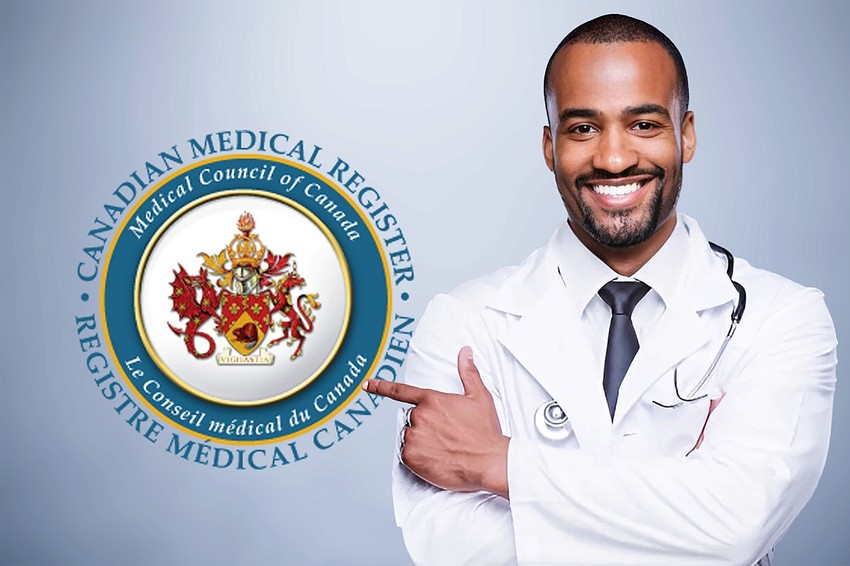Is MCCQE Part 1 Worth Taking?

Every now and then, we encounter profound questions that challenge the very essence of our professional pursuits. “Is MCCQE Part 1 worth taking?” This is one of those pivotal questions that stand out.
The important thing to remember is that even if the MCCQE1 exam is difficult, passing it has major advantages. The difficulties we face during test preparation are really a small price to pay for attaining lasting benefits. However, such a question has the potential to dash the hopes of many aspiring doctors.
This is why this post will focus on the Medical Council of Canada Qualification Exams. Explore the benefits of passing MCCQE1 and whether it is worth the time and effort. It will also guide you through some of the premier study materials available for MCCQE part 1 preparation, equipping you with all you need to tackle the exam confidently.
Overview of the Canadian Medical Licensing Exam
Understanding the rationale behind any evaluation process is not merely beneficial; it’s imperative. This knowledge fosters a more strategic approach to preparation, potentially leading to superior performance. The Medical Council of Canada Qualifying Examinations epitomize this principle.
These examinations are pivotal, acting as the custodians of Canadian healthcare standards. They serve a dual role: assessing the comprehensive medical knowledge and practical skills required for licensure and safeguarding the health and well-being of the Canadian populace by ensuring that only the most competent and prepared individuals gain the privilege to practice medicine within the country.
Each component of these exams is crafted with precision, focusing on a wide array of essential medical competencies. This rigorous testing ensures that the standards of medical practice in Canada remain high, reflecting the serious responsibility of medical professionals to their patients and society.
For medical students, grasping this underlying purpose is crucial not only for exam preparation but also for embracing the profound duty that comes with the medical profession.
These examinations are far more than mere assessments; they represent a formidable crucible, a rigorous trial by fire that discerns the truly dedicated from the rest. They command a level of preparation that is nothing short of relentless pursuit of excellence.

For international medical graduates. This translates into an unyielding commitment, involving countless hours devoted to deepening their understanding, refining their skills, and broadening their knowledge base to align with the stringent standards upheld by Canadian regulatory authorities.
Achieving success in these exams transcends the mere acquisition of a license to practice medicine within the Canadian borders. It signifies a profound dedication to continual professional growth and a supreme standard of patient care. It embodies the readiness to earn and uphold the trust that patients and their families place in physicians. It is about distinguishing oneself in an environment often saturated with mediocrity, and asserting with confidence, “I am ready. I am capable. I am worthy.“
Thus, we must never trivialize the critical importance of these qualification exams. Let us approach this challenge with determination and an unshakeable resolve. For it is through conquering these rigorous assessments that we demonstrate our capability to deliver not only adequate but truly exemplary care to patients in Canada—care that stands out as exceptional in every regard.

What are the Medical Council of Canada Qualification Exams?
In the past, passing many Medical Council of Canada qualifying exams was a requirement for getting a medical license in Canada. Candidates were required to abide by strict rules with minimal flexibility. Getting through the MCCQE was a prerequisite for signing up for MCCQE1 and later exams.
At this moment, it may seem overwhelming to consider the numerous qualification exams required to obtain a medical license in Canada. That’s because it truly was a daunting task. Allow me to provide an overview of the number of examinations required to obtain a medical license in Canada.
The exams that one needed to pass were as follows:
- MCCQE
- MCCQE Part I
- MCCQE Part II
- Nac Exam
But now that we’re in the present, the scenery has drastically changed! The total number of qualifying examinations has dropped dramatically during the past years. Obtaining a medical license in Canada is now more flexible. Accessible and straightforward process than it has ever been.
The first exam to be discontinued was the MCCQE. Leading to changes in the assessment process. Subsequently during the COVID 19 the Medical Council of Canada halted the administration of the MCCQE Part II streamlining the evaluation process further.
Canadian Medical Licensing Exam | |
Computer Based | |
MCCQE | Medical Council of Canada Qualifying Examination |
MCCQE Part I | Medical Council of Canada Qualifying Examination Part I |
MCCQE Part II | Medical Council of Canada Qualifying Examination Part II |
In Person | |
NAC | National Assessment Collaboration |
These are all Canadian Medical Licensing Exams. Over the years, the Medical Council of Canada has discussed the MCCQE and MCCQE Part 2. | |
Currently applicants must undergo two exams to demonstrate their competency. The first exam is the MCCQE Part 1 which’s a computer based assessment.
This exam aims to assess a candidates knowledge and understanding of concepts. The second exam is the NAC (National Assessment Collaboration) exam, an in person assessment that evaluates a candidates skills and their ability to apply their knowledge, in real world situations.

While there may be qualifying exams now it doesn’t imply that these exams are any less demanding. On the contrary, both the MCCQE1 and NAC tests are designed to be more challenging.
The questions and clinical scenarios are designed to be more thought-provoking. In order to evaluate applicants’ critical thinking and problem-solving abilities.

Getting a Medical License in Canada
Getting a medical license in Canada requires commitment. The length of which hinges on a myriad of the several factors.
These include the individual’s educational background, the province where they aim to practice, and the distinct mandates of the licensing authority involved.
For example, graduates of Canadian medical schools often navigate the licensing pathway more swiftly than their counterparts educated abroad. This discrepancy stems largely from the variations in accreditation and the recognition of foreign qualifications. Which in fact can complicate or prolong the process.
Moreover, each Canadian province boasts its own medical regulatory body, each with its own set of licensing prerequisites. These differences can significantly influence the duration it takes to obtain a license.
Added to this, certain regulatory bodies may impose further requirements such as proficiency in language or clinical skills assessments, potentially elongating the licensing timeline.
Given these complexities, pinning down a precise timeline for securing a medical license in Canada is challenging. However, prospective applicants should brace themselves for a journey that might extend over several months, depending on their specific circumstances.
Generally speaking. Canadian medical graduates enjoy a streamlined journey to certification, often wrapping up the process within a few months if they’re well-prepared and face no delays in taking their exams.
In stark contrast, International Medical Graduates (IMGs) navigate a more complex path. Initially, they must undergo a thorough verification of their medical credentials. Successful verification qualifies them to sit for the requisite examinations.
Unlike their Canadian counterparts who only face the MCCQE Part 1, IMGs are also required to pass the NAC exam.
This additional examination requirement underscores a significant advantage for Canadian medical students. They typically complete the NAC exam during their university training, effectively integrating it into their academic routine.
This integration significantly abbreviates the certification timeline for Canadian graduates compared to IMGs.

What Is the Role of MCCQE1 In Getting a Medical License?
The MCCQE Part 1 is an essential requirement for obtaining medical licensure. It is structured based on the objectives established by the Medical Council of Canada and aligns with the CanMEDS roles.
Some may argue its significance; nonetheless, considering its rigorous format, it appears that a consensus about its challenging nature would prevail amongst most.
The exam is divided into two segments: one featuring multiple-choice questions and another comprising clinical case simulations. Both sections are grounded in the MCC’s objectives and present equal levels of difficulty.
Understanding this structure is crucial as it aids candidates in better managing their time and refining their test-taking strategies prior to taking the exam.
Knowing that there will be 210 multiple-choice questions requiring responses within a minute each encourages candidates to develop efficient answering strategies, avoiding excessive time spent on ambiguous or lengthy questions.
However, the relevance of this examination transcends mere strategy or time management. It is designed to assess candidates’ abilities to solve problems and think critically under pressure effectively.
Essentially, it assesses how proficient medical knowledge can be applied within constrained timing to diagnose, manage or treat virtual patients accurately.
This examination ultimately tests the practical application of medical knowledge in a high-stress environment. It simulates real-life scenarios that require quick thinking and accurate decision-making.
thus, completing this test demonstrates a candidate’s grasp of principles and ability to perform effectively in demanding situations.

Does MCCQE1 Score for Residency Matter?
There is a lot of discussion in the medical world over the relevance of the MCCQE1 score for residency. It doesn’t seem like there is a clear record stating that the MCCQE1 score is required for applications to residency programs.
But think about it from the standpoint of the director of a residency program who is in charge of choosing applicants. Would a director choose a candidate with a lower score over one with a higher score if given the option?
As doctors, we know that an exam’s score is a reflection of the way a person thinks. More than just academic aptitude, a good score on this kind of test demonstrates a quick and efficient capacity to sort through clinical clues in the questions, evaluate these clues quickly, and make correct clinical decisions.
It is often known that a strong recall of key points which is dependent on ongoing review and systematic learning, is essential to doing well on this test. As a result, a high MCCQE1 score demonstrates a candidate’s critical thinking, problem-solving, and test-taking abilities in addition to their knowledge.
Program directors look for these skills above everything else in prospective residents since they will need to manage difficult and stressful situations in their training and in their future employment as medical professionals.
A candidate’s profile can be enhanced by having a high MCCQE1 score but this is not the only factor that determines whether or not they get a residency post. The selecting procedure also takes into account other important variables including personal qualities, clinical experience, and communication abilities.
Therefore, in order to improve their chances of landing a desired residency placement, you should concentrate on building a well-rounded portfolio in addition to aiming for an outstanding MCCQE1 score.
MCCQE1 Exam Dates Available
The exam is typically offered four times a year. Throughout several periods that take place in the spring, summer, fall, and winter. This timetable offers applicants a wide range of options so they may choose a day that fits their own personal obligations and preparation schedules.
It is totally up to you to decide when to take the test. The seasonal options basically provide you a window of time to choose your desired exam date, depending on your suitability and preparedness.
As for the year 2024, from August 21–September 18, Prometric accepting appointments. You can book a test appointment at any Prometric testing location that is open.
It’s important to remember that the MCC official website has the most current and correct information about the exam schedule. This will include test dates, registration deadlines and important events related to the MCCQE1.
It’s crucial to remember that scheduling is done according to first-come first-served. As a result, those with earlier applications stand a better chance of getting their desired exam date.
However, you must first get your MCCQE Part I application approved on physiciansapply.ca before you can set up an exam time. Ensuring that all applicants satisfy the requirements for the examination is the purpose of this obligatory step.
You will be notified through your account that your application has been approved and that you are now able to arrange appointments with Prometric. Additionally, comprehensive information on how to continue with the scheduling process will be included in this message.

The Benefits of Passing the MCCQE Part 1
While MCCQE1 exam preparation requires dedication and hard work to pass the exam. The benefits it brings to your medical career are truly worth it. Let’s explore some of the advantages:
- Gaining Comprehensive Knowledge
- Enhancing Critical Thinking Skills
- Gaining Confidence
- Becoming Part of a Recognized Community
Gaining Comprehensive Knowledge:
The exam evaluates a candidate’s medical knowledge. Along with clinical decision-making and problem-solving skills. To prepare for this exam you will delve deep into various categories and expand your understanding of medical concepts. This thorough comprehension will form the basis of your future clinical practice.
Enhancing Critical Thinking Skills:
The CDM part of the exam focuses on diagnosis procedures, management steps and accurate treatment. In order to answer the CDM cases correctly. you need to develop strong critical thinking skills. Improving critical thinking skills is vital for career growth especially in the medical field. Thus, this proficiency is often put to the test during examinations.
Where you are tasked with analyzing intricate medical scenarios. The process requires you to meticulously sift through the available options, discarding those that are less plausible and ultimately selecting the most accurate answers.
This rigorous exercise serves to cultivate your critical thinking abilities. Pushing you beyond mere rote learning and encouraging a deeper understanding of the subject matter. However, the benefits of honing these skills extend far beyond passing an exam.It helps you make well-informed decisions confidently in your daily medical practice.
Gaining Confidence:
Preparing for the MCCQE1 requires intense studying and dedication. As you overcome the challenges the exam presents. You will gain more confidence in your abilities. This newfound self-assurance will carry over into your clinical practice, making you a more effective and trusted medical professional.
Becoming Part of a Recognized Community:
The LMCC license, which stands for “Licensee of the Medical Council of Canada,” is very important to doctors in Canada. When you obtain the certificate. You become part of a recognized community of medical professionals who have successfully navigated the demanding Canadian medical licensing process. This community provides support, networking opportunities, and a platform for continuous professional development throughout your medical career.
However, passing the exam goes beyond the validating of your medical knowledge and clinical skills. It gives you a lot of chances for advancement in your career. It opens the door to many possibilities that are only open to people with an LMCC certificate. Opportunities such as:
- Access to Residency programs
- Path to Secure Job with High Salary
Access to Residency programs:
The advantages of successfully completing the MCCQE1 are numerous and go well beyond simply confirming one’s medical knowledge and clinical abilities. Undoubtedly, reaching this significant achievement is comparable to accessing a wealth of professional progression prospects that are only accessible to individuals who own the LMCC certificate.
An example of such an opportunity is obtaining entry to a residency program, which may greatly improve your practical abilities and expand your professional connections.
These programs, offered by renowned universities, have been thoughtfully developed to enhance your abilities and competence. They provide a comprehensive overview of several medical diseases, including their diagnostic and treatment procedures. Acquiring this extensive knowledge enables you to provide outstanding care to patients.
Moreover, it provides access to research prospects and academic employment in the medical domain. These roles provide an opportunity for you to contribute to the progress of medical knowledge and have a substantial influence on patient treatment.
Path to Secure Job with High Salary:
High salary is the second main advantage of getting a medical license in Canada. However, the average annual pay in Canada is about $50,000 CAD. It is possible for a licensed medical practitioner to get a six-figure annual salary.
A high salary offers assurance and consistency as one embarks on a medical career. This feature enables you to focus on providing outstanding care to your patients. In addition, it provides opportunities for professional growth.
The best part is that you can take this even further by entering subspecialties. Some subspecialties take a few months, depending on the specialty. For instance, in family medicine, the majority of the subspecialties require six months of training.
Overall, pursuing subspecialties not only enables one to increase one’s earnings through providing advanced care but also provides opportunities for professional development.

How Can Ace QBank Help You Score High in MCCQE1?
The MCCQE1 is an assessment with rigorous requirements. No worries though, Ace QBank is the question bank designed based on the MCC objectives. These are the same objectives set by the Medical Council of Canada. Why does this matter? Because the exam questions and clinical cases are designed based on these objectives.
That’s what makes Ace QBank stand out as a powerful companion, with a unique array of tools meticulously designed to enhance your preparation journey. Let’s delve into how this robust platform can significantly boost your exam performance.
Customized Learning Journey
The platform’s capacity to customize the learning process is one of its most unique aspects. Understanding that every applicant has particular skills and areas in need of development, the Qbank provides the resources needed to design a customized study schedule.
This includes the Time and Tutor study styles. While the Tutor mode improves comprehension of challenging topics as well as boosting recall, the Time mode allows applicants to replicate actual test conditions.
By focusing efforts on areas that need the most attention, this customized strategy makes sure that preparation time is used as efficiently as possible, maximizing results.
A Realistic Exam Environment
The secret to passing the exam is not just knowing a lot of material, but also being able to function well under pressure and being comfortable with the structure.
With the help of the Qbank, which offers a realistic test simulation, you may prepare with sample questions in an environment that is quite similar to the real exam.
Test anxiety is a frequent problem that many applicants have, however this particular aspect of the question bank is quite helpful in lowering it. Through the use of a simulated test, you may cultivate efficient time management techniques—a critical ability that many applicants fail to emphasize.
Your chances of achieving a good exam score are greatly increased when you combine these three factors: increased time management skills, less test anxiety, and familiarity with the exam structure.
Keeping Pace with Current Standards
In a field that is perpetually advancing like medicine, maintaining pace with the latest practices and guidelines is absolutely crucial.
Ace QBank comprehensively addresses this necessity by assuring that its content is consistently updated and contains the most recent medical guidelines and objectives.
This commitment to staying current ensures that you are prepared with the most up-to-date information. This not only establishes the question bank as the most reliable platform. However, it gives you a clear edge in the MCCQE1 exam as well.
Level up your exam success with Ace Qbank!
Elevate your exam performance to new heights, and experience unparalleled quality for free with our demo account today!
Foundation of Success
The question bank serves as an extensive reservoir of knowledge with over 2,700 high-yield questions designed to cover the breadth and depth of the MCC objectives. These questions are crafted not just to test knowledge but to enhance understanding, integrating evidence-based medicine into their explanations. This approach ensures that candidates are not merely memorizing information but are understanding the core concepts that underpin medical practice.
Each question is accompanied by concise and in-depth explanations, providing insights into both correct and incorrect choices. This feedback is crucial as it helps clarify misunderstandings and solidify correct knowledge. Importantly, the Qbank offers a novel feature allowing candidates to revisit previously answered questions, particularly those they got wrong, thus reinforcing learning and mastery through repeated practice.
Sharpening Clinical Decision making
One of the elements of the MCCQE1 is decision making, seen as the heart of medical practice. The Qbank offers, over 140 Clinical Decision Making (CDM) cases to assist candidates in honing the skills needed for success in this field. By working through each case you can apply knowledge in real world scenarios enhancing your ability to make critical judgments promptly and accurately.
The platform supports the learning process by providing flow charts and summary tables aiding in understanding and applying knowledge while engaging with these case studies. This feature proves beneficial when transitioning from learning to application a vital aspect evaluated during examinations.
Putting Your Knowledge to the Test
A complete comprehension of the objectives and the ability to assess your knowledge in an environment that closely resembles the real exam are prerequisites for the demanding MCCQE1 preparation.
This is a need that the Qbank recognizes and meets by offering thorough self-assessments. These assessments consist of 120 carefully chosen questions covering high-yield topics.
In addition, every question in the self-assessment is connected to a specific objective, so you can see where your knowledge could be deficient. Your preparation will be more successful and efficient thanks to this focused approach to evaluation, which makes it easier to review the mistakes.
With the question bank you are participating in a systematic method of preparation that will increase your comprehension and boost your performance.
Passing the test is not the sole objective; getting a high score that demonstrates your commitment, diligence, and subject-matter expertise is also important.
Ace QBank offers more than just a question bank. It is a comprehensive platform designed to address every aspect of exam preparation for the MCCQE1. From the depth and breadth of practice questions to simulation of exam conditions, from personalized learning paths to the most up-to-date content. The Qbank equips candidates with the tools necessary not just to pass but to excel.

Physician to Physician: Is MCCQE Part 1 Worth Taking?
Pursuing a medical license for practice in Canada is not just a simple effort; it is a profound and life-changing event that will significantly influence your career and have a profound effect on the lives of numerous persons.
The path ahead may appear intimidating, with obstacles and unknowns, but be certain that each obstacle you conquer puts you nearer to a gratifying and esteemed position with a promising salary in the Canadian healthcare system.
When exploring the complexities of medical education and training. It is important to remember that obtaining a medical license involves refining your abilities broadening your understanding and accepting the duty of looking after the health and welfare of others.
The challenging demands of medical training can be tough. But they help you become a competent and compassionate healthcare provider. One capable of making a positive difference in your patients’ lives.
Meanwhile, the substantial financial benefits should not be disregarded. Although the route of become a certified medical practitioner may necessitate sacrifices and diligent effort, the potential for high salaries and employment stability upon completion provides a unique sense of security and empowerment that is unparalleled by most other occupations.
By demonstrating commitment and persistence, you have the capacity to not only achieve a satisfactory income but also establish opportunities for career progression, specialized training, and professional development that will enhance your work and increase your influence in the healthcare field.
I hope this post will resonate with you, particularly those of you poised at the threshold of a career in medicine. As you navigate through the demanding terrain of your examinations, it’s crucial to look beyond these immediate challenges and contemplate the significant influence your expertise could wield in society. The reality is that the possibilities are boundless, and the rewards for your dedication are immensely gratifying.
Embrace the difficulties, grasp the chances, and consistently remember the significant influence your efforts will have on the lives of the people you assist. Although the journey may be challenging, the benefits of obtaining a prominent career with lucrative pay in Canada justify every effort.
In other words, the prestigious job with a high salary in Canada makes every step worth it.
Key Takeaways
We delve deep into the essence of the MCCQE1, exploring not only its stringent requirements but also the significant opportunities it unlocks. This examination isn’t merely a hurdle; it’s a gateway that tests the readiness of medical professionals to face Canada’s healthcare challenges. Passing the exam is both daunting and invaluable, reflecting a commitment to upholding the high standards of patient care and medical excellence in Canada.
The MCCQE1 plays a key role in the professional development of physicians, and passing the exam signifies far more than meeting a regulatory requirement. It embodies a dedication to continual learning and adaptability—traits essential for navigating the complexities of modern medicine.
Passing the exam paves the way for engaging in specialized training and accessing residency programs, ultimately influencing the quality of healthcare across communities. It also leads to a prestigious job with a high salary in Canada, which makes every step worth it.


